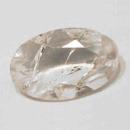|
|
|
|
Click on a letter above to view the list of gems. |
|
|
|
|
|
Yugawaralite |
|
| Chemistry: CaAl2Si6O16 • 4H2O | |
| Discovered
in 1952 ;
IMA
status: Valid (pre-IMA; Grandfathered). | ||
|
| ||
|
Classification |
|
|
| |
|
Silicates | |
|
|
8 : SILICATES 90: Zeolite Group (Laumontite Subgroup) |
|
|
|
|
Crystal Data |
|
|
|
|
|
Crystals are flat tabular, to 8 cm; in groups of nearly parallel crystals |
|
|
None |
|
|
|
|
|
Physical Properties |
|
|
|
|
|
[100] Distinct, [101] Imperfect, [010] Indistinct (parting) |
|
|
Conchoidal |
|
|
Very Brittle |
|
|
4.5 - 5.0 |
|
|
2.20 - 2.25 (g/cm3) |
|
|
None |
|
|
Not Radioactive |
|
|
Other: | |
|
|
|
|
Optical Properties |
|
|
|
|
|
Colorless, White, Pinkish |
|
|
Transparent to Translucent |
|
|
Vitreous, Pearly |
|
|
1.492 - 1.504 Biaxial ( + ) |
|
|
0.0090 |
|
|
Weak to Distinct; r < v |
|
|
None |
|
|
|
|
|
Occurances |
|
|
|
|
|
Geological Setting: |
As crystals lining cavities, and veinlets, typically deposited in active geothermal areas. |
|
Type Locality: |
Yugawara Hot Spring, Kanagawa Prefecture, Kanto Region, Honshu Island, Japan |
|
Year Discovered: |
1952 |
|
View mineral photos: | |
|
|
|
|
More Information |
|
|
|
|
|
| |
|
|
|
|
Yugawaralite crystals are only found in
a few locations worldwide and few of these are facetable.
Sources include Japan (the Type Locality); Bombay,
India; Alaska; Iceland; Sardinia; British Columbia.
The best source for facet grade crystals is probably
the Khandivali Quarry, near Bombay, India where well-formed,
colorless, transparent crystals up to 3 cm have been
found. |
|
|
We
have not photographed our Yugawaralite gems yet. Please
check back soon! |
